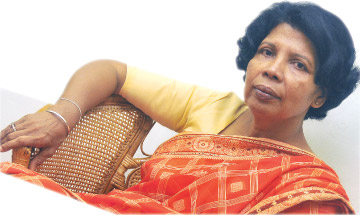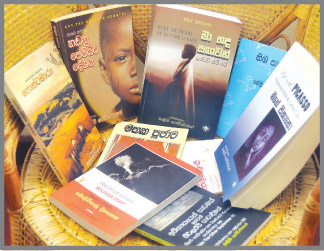
Undying passion for writing
Sachitra MAHENDRA
Malini Govinnage translated Ignazio Silone's 'Fontamara' into Sinhala
as a second year undergraduate. The setting of the novel is
poverty-stricken southern Italy under Mussolini's fascist regime-but it
could easily be any time, anywhere that the poor see their very
existence threatened by the powers that rule and own the earth.
"We were always motivated to read differently - to find a new meaning
in a text. As a result of being introduced to new literature, especially
non-European fiction and poetry, I was drawn towards translating poetry
and fiction."
So recalls Govinnage, 'Encounter of the Week'.
Malini Govinnage's literary career
Che (The biography of Ernesto Che Guevara) This is not a translation ,
my own creation.
Fontamara (Ignazio Silone's )
Mathaka Poojava (Collection of poems)
Hima Patti (PaulGalico's The Snow Goose)
Handanu Pembara Desaya (Alan Paton's Cry, the Beloved Country)
Punchi Kumaraya (Saint de Exupery's Little Prince)
Boliviyanu Dinapotha (Ernesto Che Guevara's Bolivian Diary)
Ithihaseyen Padamak (Chile the Other September 11)
Kivinda Hadata Ebie Balan (Rainer Maria Rilke's Letters to a Young poet)
Mage Picasso (Francois Gilot's Life with Picasso)
Ma hada Sangavan Wounded Kneeye (Dee Brown's Bury my heart at Wounded
Knee) |
 |
|
Malini
Govinnage Pictures by Saman Sri Wedage |
Q: You belong to the rare calibre of journalists who went
beyond the usual scope into poetry, translations and publishing.
Journalists who work beyond their scope are not so common at this age,
unlike in the past. What do you think the reason is?
A: I doubt whether I can call myself a journalist now anymore
since I have not been actively involved in the profession for the last
few years. I was a poet and translator before I joined the press as a
journalist. Those two skills helped me in my journalistic career. But I
felt the journalist in me was slowly killing the poet inside. I think it
is partly my struggle to keep all these three: journalist, poet and
translator, well and alive in me and partly my exposure to the vibrant
academic and intellectual atmosphere at the University of Kelaniya
during the first few years of the 1970s that created the person in me
whom you consider as a 'journalist with a rare calibre'.
Q: Books were the main asset during the 1970s.
A: The socio-political atmosphere in the country as well as in
the world at large during the early 70s had a profound effect on us, the
young, raw undergraduates who were thirsty for knowledge and impatient
for change of certain things we saw as unjust. There was no TV at that
time. We hardly had facilities to listen to a radio. But we had books
and good teachers. The teachers like A G M Sirimanne, Gamini
Hattetuwegama and Ranjith Gunawardena were different from many other
lecturers at the time. They brought us the wide world outside into the
class.
The Vietnam war and the student struggles in many parts of the world
- new poetry and literature- works of literary and theatre personalities
like Bertolt Bretcht, Garcia Lorca and Samuel Beckett, philosopher
writers and theorists like Franz Fanon Andre Malraux and the likes. We
saw the lion in Dr Sarachchanddra's 'Sinhabahu' in new light when our
drama teacher Gamini Hattetuwegama sang Sinhaba.
Q: You have translated from English to Sinhala as well as from
Sinhala to English. Which translations have more impact on Sri Lankan
culture, and why?
A: Obviously, it is Sinhala translations that have more impact
on Sri Lankan culture. Sinhala readers are somewhat tired of or less
enthusiastic in reading original Sinhala works - Sinhala fiction - since
lately. There are reasons. Readers don't find any novelty in the plots,
the experience of the characters or the settings. Most of these works of
fiction hardly offer reader anything let alone enjoyment of reading a
work of fiction.
In contrast, Sinhala translations from English - the original work
may be in a language other than English - appeal to the Sinhala reader.
Cultural settings of a foreign land, true to life characters, out of the
ordinary plots are some reasons for this appeal.
Q: You have chosen to translate Sinhala poetry into English,
which hardly anyone dares to take up. How do you get inspiration and
capacity?
 A: First I should say well ahead of me many eminent writers
who belong to the cream of intelligentsia in the country have translated
Sinhala poetry into English. Great ladies like Dr. Lakshmi de Silva and A: First I should say well ahead of me many eminent writers
who belong to the cream of intelligentsia in the country have translated
Sinhala poetry into English. Great ladies like Dr. Lakshmi de Silva and
Dr Ranjini Obeysekera have translated Sinhala classical and folk
poetry. In my case, I have translated one collection of poetry. I should
say it was received well.
You ask me how I get the inspiration and capacity. As I have
mentioned earlier, I was originally a poet and translator. Poetry for me
is imaginative painting. Translating a poem is freezing your
interpretation of the original poem. Then it is no more a 'translation'
but a new creation. So is with translating fiction.
Q: The journalists have made it a habit of compiling their
newspaper articles into book format. This was practised by the likes of
Martin Wickramasinghe, and now it is happening quite often. Your
comment.
A: It is worthwhile if the writer is a veteran in a chosen
field and if his or her writing is outstanding in terms of facts and
literary or socio political value. But today practically every
journalist wants to publish their writings to the newspaper as a book. I
feel they do it for their own satisfaction and they probably know that
people do not buy such books unless as charity.
Q: You are the founding editor of Daily News Buddha Pradeepa.
How do you analyze the local English readership of Buddhism?
A: Generally it is the older, English educated who read the
Books on Buddha Dhamma .They are mostly retired professionals. There are
others who read for research purposes. Other than that, the young or
not-so-young are not interested at all. Any way there has been a steady
readership for lighter writing on lighter Dhamma themes. They do not
want to, or they cannot, comprehend deep aspects of Dhamma such as
Abhidhamma or Paticca Samuppada.
Q: You have chosen to translate lesser known works into
Sinhala. Do you have any purpose when you choose a particular work to
translate?
A: Yes I choose a book with a strong purpose. Through my
translation, I want to convey a message to the reader. It may be either
political or social. When I translated Fontamara, Cry, the Beloved
Country or Bury my Heart at Wounded Knee My purpose was political. I
wanted to show a strong woman who defied male tyranny when I translated
Life with Picasso.
Q:The book market is abound with Sinhala translations of
various English works. Your comments.
A: It is good .But most of these translations may be not be
good, worthwhile to read originals. Or the translations might not be
faithful to the original works. It is the responsibility and the duty of
the translator to offer a good book to his or her reader. Forming a
regulatory body to check on the translations is an impossible task.
|





